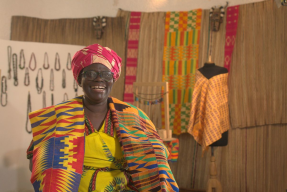Kenya’s Post-Election Crisis Revisited.
August 14, 2009By Alison Carlman, KF8, Kenya
Kenya’s post election violence is probably far from the minds of most people in the world. After all – the contested election and its ensuing rioting happened in late 2007, and that was years ago. (See Former Kiva Fellow Zack Turner’s blog post from 2008 here, describing the conflict.) Surely you’d think that people were recovering from the trauma and have moved on with their lives.
Yes and no.
In my first several weeks of borrower interviews, a few borrowers brought up the violence when asked I about their challenges. Many eyes even swelled up with tears as these Kenyans described what happened to their businesses and to their families in the aftermath.
Surprised by how close it all still felt to many of these people, I began to ask every borrower about the post-election violence and how it has affected their lives. They have remarkable stories. Peres Akinyi Mimba, for example, had a successful informal hardware business in 2007. “I had a big shop, I even had to transport things on lorries” she explained to me. But during the period of violence her shop was looted and she lost most of her goods were stolen. Now she is taking a loan out to help re-build her business back to where it was before – she currently just sells basic paints and nails, but she wants to sell a larger variety of hardware supplies.

Alison (right) interviewing Consolata (center), with help of K-MET translator, Debra (left)
The shadows of that horrible season of destruction are still looming here in Western Kenya. Consolata Akinyi, a Kiva borrower, is a farmer whose entire crop was destroyed by looters. This happened to many of the farms in the Kisumu area. K-MET, a Kenyan MFI focused on health and education, saw that the results of this violence and subsequent economic crisis left many of the city’s children suffering from severe malnutrition. So K-MET started a food security program to help Kisumu community members work together to fight hunger with local resources.

Consolata on her "Otieko Ketch" Farm
Consolata is part of this K-MET initiative, she joined a group of neighboring farmers called “otieko ketch” (“eradicate hunger”). Most of the 19 women and 2 men in this group have taken Kiva loans to grow their farming businesses and fight malnutrition in their community. They share resources and advice for each other, including thoughts on how to draw water from the river for irrigation, and how to keep rogue hippopotamuses from destroying their crops(!).
Many of the people I meet still have a long way to go to get their businesses, families, and communities back to the place they were before the post-election violence. And some, who lost dear family members and friends, will never be the same. But thank you to Kiva lenders for helping the Kisumu community rise out of this tragedy with dignity and hope.
___________
Alison Carlman is in her 9th week as a Kiva Fellow in Kisumu, a city that she loves. She is currently a graduate student studying Community and Development at the Univerity of Stellenbosch in South Africa. To learn more about K-MET’s innovative approach to microfinance, click here. If you’re already excited, join the K-MET lending team!
PREVIOUS ARTICLE
BOOM! housing (a case for housing loans) →NEXT ARTICLE
A Tale of Two Cities in One →













